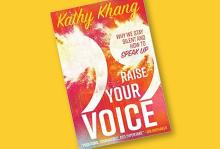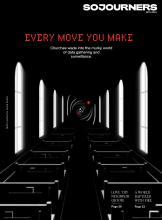How do marketing techniques, such as surveillance and data gathering, fit with the mission of the church?
marginalization

"WE WILL MAKE you humble,” the superior in the Catholic order told me. I was 18 years old and had just joined a community of Catholic women religious.
We were eating dinner, and I was excitedly telling her and the other sisters what I had learned in theology class. A sister asked me, “Do you want to be a theologian?” Without hesitation, I answered “yes.” She shot a quizzical look at the superior, who said, “Being a theologian is likely to make you proud and arrogant. Don’t worry—we will make you humble.” She and the others smiled knowingly. Confused and hurt, I shut up.
Becoming a theologian was not something that I wanted to do for prestige. It was what I felt called to do; it was, and is, my vocation. As is usually the case in stories like this one, not all the sisters agreed with the superior’s comment.
Later that evening, one of the older sisters approached me as I was studying in the convent library. She put her hand on my shoulder and said, “Little sister, do you know what humility is?” Before I could reply, she said, “Humility is the truth.” Then she pointed at my books and notes. “The truth is that you love to study, question, think, and write. The truth is that these are the gifts God has given you. So be humble: Accept them and do something with them for the greater good.”
My life has taken me far from that convent library, but I’ve never forgotten her words because they freed me. After all, isn’t that what truth does? It sets us free. But free from what?

I MET KATHY KHANG last summer. She joked about turning to Korean face masks and wine in her times of need; I immediately thought to myself that we’d really get along. Fortunately, her expertise in crafting both engaging conversation and knockout tweets (@mskathykhang) translates well into her latest book, Raise Your Voice: Why We Stay Silent and How to Speak Up.
Khang, who emigrated from Korea to the U.S. as a child, has worked in various settings, including newsrooms and university campus ministries. She brings her journalism and ministry experience to activism, recognizing that social justice always involves multiple intersections of race, gender, orientation, faith, politics, and more.
Raise Your Voice is an authentic diagnosis of, and antidote to, the deafening silence from many women and minorities in the workplace, politics, the world, and, most potently, in our spiritual and worship spaces. Khang crosses social, cultural, professional, and generational boundaries to create a tool useful to anyone who has ever felt either like they didn’t have a voice, or that their voice was taken from them.
 #OccupyWallStreet (the New York-based protest against social and economic inequality, corporate greed, and the influence of corporate money and lobbyists on government) has moved to a new location, a street where the air is far sweeter than on Wall Street.
#OccupyWallStreet (the New York-based protest against social and economic inequality, corporate greed, and the influence of corporate money and lobbyists on government) has moved to a new location, a street where the air is far sweeter than on Wall Street.
Won't you tell me how to get, how to get ... there?
That's right, folks, the occupation has taken over Sesame Street.
I admit it: A few years back, when I first heard about the E-Verify program, I thought it sounded reasonable. The program was described to me as a way for employers to voluntarily verify the U.S. citizenship of their employees by cross-checking their information with the online databases of the Department of Homeland Security and the Social Security administration. I knew that there were flaws in the system, which sometimes misidentified workers as undocumented even when they were not. However, I thought, what employer doesn't deserve the right to check the employment eligibility of his or her workers?
"I will call them my people, who were not my people. And her beloved, who was not beloved." (Romans 9:25 referencing Hosea 2:23)
Estranged, alienated, and removed; anyone living in an industrialized modern society in the 21st century would be able to define, or at least identify the sentiments of these words. Our time is one of mass communication and instantaneous access to knowledge. And yet our lives are too compartmentalized, increasingly divided, and our society reflects this. Indeed the existential writers of yesteryear were correct in diagnosing the iron cage that would befall us, ultimately leading to an eclipse of reason.

